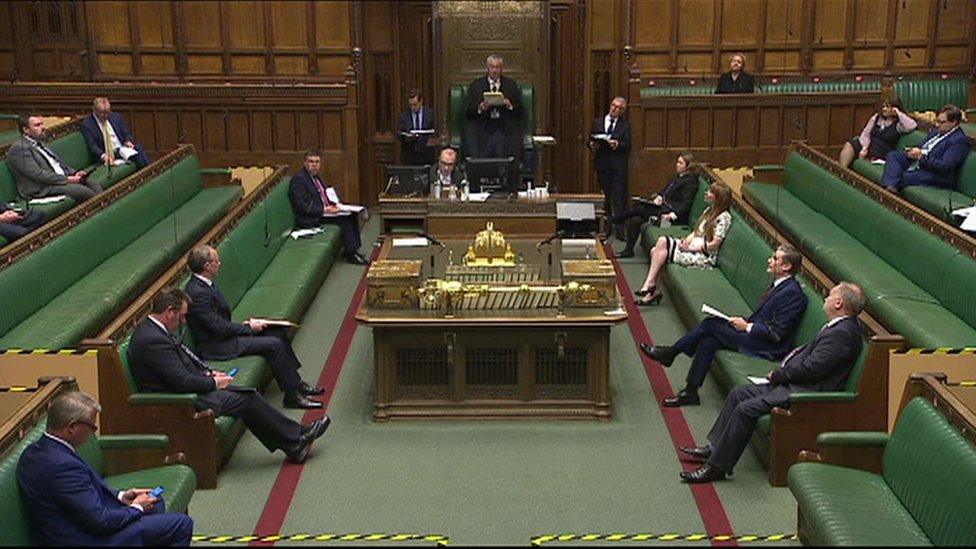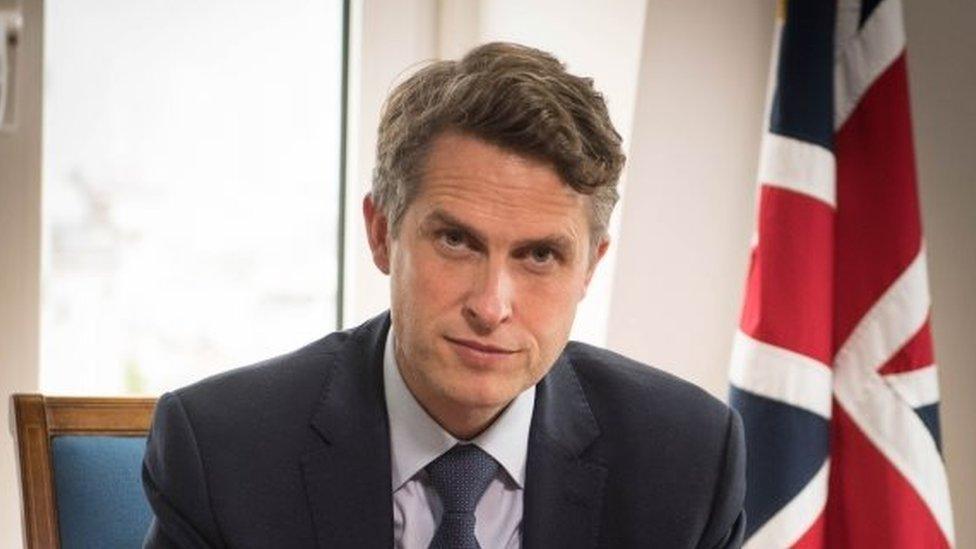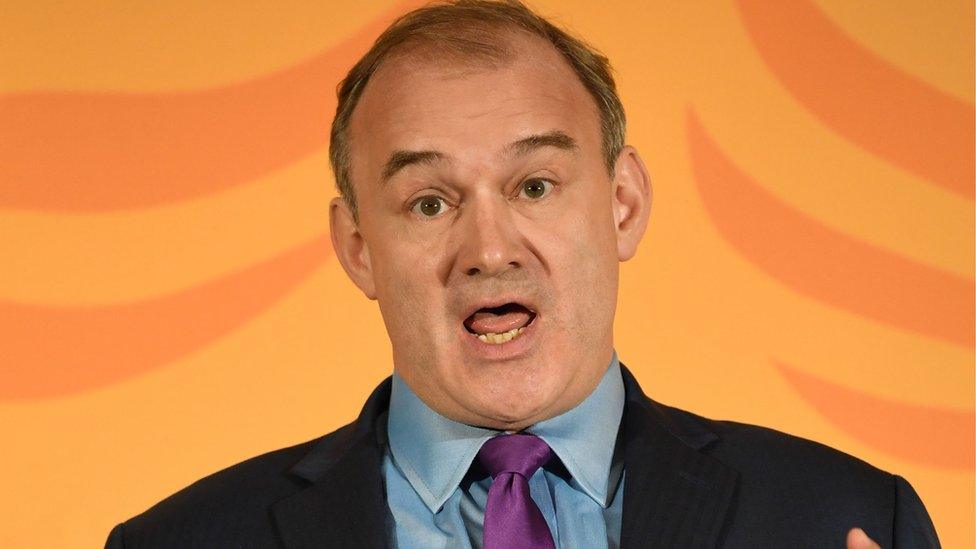The week ahead in Parliament
- Published

After an eventful month away from Parliament, MPs return to pick up the threads of the pandemic and Brexit in a shortened Westminster week.
They won't be refreshed and bushy-tailed, but grumpy and beleaguered, especially on the Conservative benches, where the ministerial handling of the A-level results, the issue of mask-wearing in schools and the proposed new planning system have not been well received (backbenchers are all in favour of the PM's "Build, build, build!" slogan until it is applied to their constituency).
A few political fates may rest on whether the ministers involved can defend themselves effectively at the dispatch box.
And behind the ramifications of the pandemic, the next moves of Brexit are never far away, with Tory Brexiteers increasingly wary of the government striking what they would regard as an unacceptable deal with the EU.
Unhealed and poorly bandaged wounds may soon be broken open again.
Both the Lords and the Commons have serious law-making looming; MPs start work on the Fisheries Bill, a highly-significant Brexit measure, while peers will soon be sinking their remaining teeth into the detail of the Agriculture Bill, with the prospect of some government defeats on the central issue of requiring imported food allowed by any trade deals to meet existing UK standards (with the US chlorinated chicken and hormone-fed beef very much in mind).
It is worth noting that some of the orders and regulations that will be laid before Parliament, particularly on pandemic issues, will be every bit as significant as the primary legislation. It is normally pretty rare for Parliament to do anything other than rubber-stamp them, but there may be a mood to kick back - particularly in the Lords.
The mood amongst their Lordships is every bit as grumpy as that of MPs - there's talk of boycotting the introduction ceremonies for some of the prime minister's list of peers. But, when it comes to legislating, the effect of the Lords virtual proceedings may help the government, because plotting in person, over a G&T, is easier than organising an insurrection via WhatsApp - particularly where the crucial votes of crossbench or independent peers are involved.
Tuesday 1 September
The Commons resumes (14:30) with health and social care questions, doubtless to be followed by a considerable number of ministerial statements or urgent questions.
An appearance by the education secretary, Gavin Williamson, to update MPs on exams, returning to school, masks etc, looks pretty probable, along with a pandemic update, and perhaps Foreign Office statements on Belarus and other world crises. These events are normally decided at the Speaker's daily meeting, and announced before the House sits, and they could absorb several hours after question time, before MPs move to the day's scheduled business.
The day's Ten Minute Rule Bill from the Lib Dem Christine Jardine, the party's spokesperson for home affairs, would grant indefinite leave to remain to National Health Service and social care staff, to recognise the invaluable role that foreign workers have played on the frontlines of the coronavirus pandemic.
Then MPs turn to the second reading of the Fisheries Bill, a major Brexit bill, much mauled in the House of Lords, where the government was unable to prevent amendments adding an over-riding sustainability objective to the bill, on electronic monitoring of fishing vessels, minimum quotas for new entrants, a national landing requirement to ensure a minimum percentage of fish caught in UK waters are landed in UK ports, and limiting ministerial powers to change the regulations to reflect international agreements.
The government may seek to reverse some of these changes and bounce the bill back to peers.

Education Secretary Gavin Williamson will be under pressure from MPs when they return to Westminster.
On the committee corridor, Foreign Affairs (14:30) examines the UK's role in strengthening multilateral organisations - the star witness is the former Australian PM, Tony Abbott.
The Treasury Committee (09:00) takes evidence from a series of economic savants on "tax after coronavirus," and Environment, Food and Rural Affairs (14:30) has a session on flooding, exploring the response to the winter floods, the impact of new government policies on flooding and development, requirements around funding for flood risk management, the uptake of flood insurance and property-level resilience, and the involvement of communities in decision-making..
The Lords will not be sitting; peers return on Wednesday.
Wednesday 2 September
The Commons opens (11:30) with half an hour of Northern Ireland questions, followed at noon by Prime Minister's Question Time - which will see a debut for Sir Ed Davey as the newly elected Lib Dem leader, after several appearances as acting leader. There could also be another clutch of post-holiday statements and urgent questions.
The day's Ten Minute Rule Bill is an interesting offering from the Conservative Anthony Mangnall - who defeated Sarah Wollaston at Totnes at the last election. She was elected as a Conservative in 2010, and in 2019 she switched parties, first to the short lived Change.UK, and later to the Liberal Democrats. I don't think it would be a wild stab in the dark to suggest that this chain of events has inspired his Recall of MPs (Change of Party Affiliation) Bill, to require MPs to call a by-election if they defect to another party.
The day's legislative action is the second reading of the Private International Law (Implementation of Agreements) Bill - another bill significantly amended in the Lords, to remove a clause that would have given UK and devolved ministers powers to implement any international law agreement relating to private international law by regulations.
The committee business includes Northern Ireland Affairs (09:30) which will hear from Simon Byrne, chief constable, Police Service of Northern Ireland in their inquiry: "Addressing the legacy of Northern Ireland's past: The UK government's new proposals."
But the key witness may be former chief constable Jon Boutcher, the head of Operation Kenova - the investigation into the individual codenamed Stakeknife, looking at the involvement of this alleged state agent in kidnap, torture and murder by the Provisional IRA, and whether there is evidence of criminal offences having been committed by members of the British Army, the security services or other government personnel.
Transport (10:15) takes evidence on young and novice drivers from road safety campaigners, academics, and road safety charities. They will be looking at why they are at a higher risk when it comes to road traffic collisions and casualties, and the policy options and interventions which could reduce the risks.
Work and Pensions (09:30) has a session on the wait for the first payment of Universal Credit, with witnesses from the National Audit Office and the Financial Conduct Authority; Treasury (14:30) has the governor of the Bank of England, Andrew Bailey, and other Bank officials talking about the Economic impact of coronavirus, and Women and Equalities (14:00) hears from a panel of ministers from different departments in their inquiry "Unequal impact? Coronavirus, disability and access to services."
The Lords return (12:00) with questions to ministers ranging across progress on a trade deal with the EU on non-financial services, public investment in carbon intensive sectors, and childhood obesity.
The main legislative action is the second reading of the Medicines and Medical Devices Bill. This creates a regulatory system which allows the UK to move away from EU rules and regulations in future, and more rapidly amend existing regulations in response to emerging safety issues or new advances, without having to bring a new bill before Parliament every time the government wants to revise the rules. The bill will also strengthen the Medicines and Healthcare Products Regulatory Agency, with powers over registration of devices and disclosure.
There is also important action elsewhere, as the House will resume considering some bills and lots of statutory instruments in Grand Committee - and from 14:30 peers will be gnawing their way through a series of SIs. The Industrial Training Levy (Engineering Construction Industry Training Board) Order deals with funding for training in the industry; the Equivalence Determinations for Financial Services (Amendment etc.) (EU Exit) Regulations create a system for ensuring that financial services from the EU have equivalent oversight to UK products; and the Immigration (Persons Designated under Sanctions Regulations) (EU Exit) Regulations creates an independent UK system for enforcing financial sanctions and travel bans on people involved in human rights abuses, for example in Russia, North Korea and Iran, as well as non-state actors like Daesh, Al Qaeda and other terrorist groups. The Investigatory Powers (Communications Data) (Relevant Public Authorities and Designated Senior Officers) Regulations gives powers to use communications data to organisations like the Environment Agency, to allow it to combat serious organised crime in the waste sector.
Finally the ponderously-titled Functions of the Investigatory Powers Commissioner (Oversight of the Data Access Agreement between the United Kingdom and the United States of America and of functions exercisable under the Crime (Overseas Production Orders) Act 2019) Regulations deals with the oversight of the international agreement which will allow UK public authorities to obtain data directly from US-based telecommunications operators for the purpose of preventing, detecting, investigating, and prosecuting serious crime.
Thursday 3 September
MPs begin their day (09:30) with international trade questions, followed by the weekly Commons business statement from the leader of the House, Jacob Rees-Mogg.
At the moment the main legislative event is the committee and remaining stages of the Non-Domestic Rating (Public Lavatories) Bill, a tidying-up measure so minor that there would be plenty of scope to add something else to the Commons agenda. Either that, or MPs will be taking quite an early bath.
There's an unusual amount of committee action, with Home Affairs (10:45) looking at Channel crossings, migration and asylum-seeking routes through the EU, with Robert Jones, director of threat leadership at the National Crime Agency. Welsh Affairs (09:30) are looking at Brexit and trade: implications for Wales, and Scottish Affairs (14:30) at coronavirus and Scotland, with witnesses from the fisheries industry.
In the Lords (12:00), questions to ministers cover the quality of the work carried out by the Independent Commission for Aid Impact, increasing the rate of tree planting, and former minister Lord Rooker continuing his long-running campaign on adding folic acid to flour.
The main debate is on the Health Protection (Coronavirus, Restrictions) (England) (No. 3) Regulations 2020, which came into effect on July 18th. This is what's known in the trade as a "made affirmative statutory instrument," a measure which is so urgent that it is put into action immediately, on the signature of a minister, and only put before parliament after the event. This one gave local authorities powers used for the control and prevention of coronavirus - banning events in their area, restricting access to particular premises, etc, where they faced a serious and imminent threat to public health. As I write there are 18 speakers listed for this debate, but more will doubtless pop up.
Then, peers turn to the Representation of the People (Electoral Registers Publication Date) Regulations 2020 - effectively, these move the publication date for the next Register of Electors from December 1st 2020 to February 1st 2021, allowing Electoral Registration Officers an extra two months to complete the 2020 canvass, as a result of the pandemic.
Finally, there's the Mobile Homes (Requirement for Manager of Site to be Fit and Proper Person) (England) Regulations 2020 , which does what it says on the tin; a review of the operation of mobile homes sites revealed examples of operators who harass and financially exploit residents. These poor practices and unprofessional behaviour have a significant impact on people, many of whom are elderly and on low incomes.
In Grand Committee (from 14:30), peers consider more SIs - including the Fatal Accidents Act 1976 (Remedial) Order 2020, which will allow the cohabiting partner of the victim of a fatal accident to seek compensation.
Neither House sits on Friday 4 September.
- Published31 July 2020
- Published26 August 2020

- Published27 August 2020

